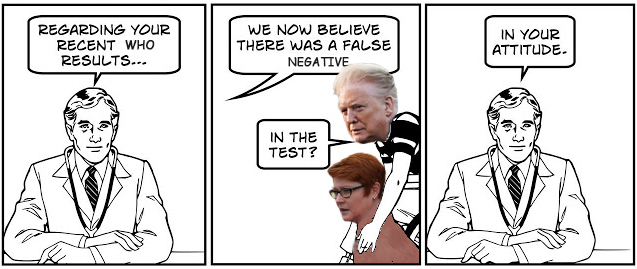

by John Helmer, Moscow
@bears_with
A coordinated attempt by the Australian and US governments to blame China for the corona virus, and to attack the World Health Organisation (WHO) for covering this up at China’s behest, failed when the World Health Assembly (WHA) voted on Tuesday afternoon.
The terms of the Covid-19 resolution adopted by the 194 member-state assembly declared it is up to the WHO to “initiate, at the earliest appropriate moment, and in consultation with Member States, a stepwise process of impartial, independent and comprehensive evaluation, including using existing mechanisms”.
This language, originally sponsored by the European Union (EU) and Russia, repudiated the Australian demand, issued after talks with President Donald Trump (lead image, centre) on April 22, that an investigation should be conducted independently of the WHO because “the government does not hold faith in the WHO, or its decision-making body the World Health Assembly, to lead a probe into the pandemic”.
The WHO could not be trusted to investigate itself or the origin of the Covid-19 virus, said Foreign Minister Marise Payne (lead image, centre). She does “not believe the WHO should run the inquiry,” the official told a state media organ. “It will need parties, countries to come to the table with a willingness to be transparent and to engage in that process and to ensure that we have a review mechanism in which the international community can have faith.” The WHO, she added, “strikes me as somewhat poacher and gamekeeper”.
The terms of the resolution adopted on Tuesday also ignored the claim by Australia’s agriculture minister that the Huanan wild animal market in Wuhan was the starting point for the virus to develop in human beings. “We should be damn proud as a nation,” said David Littleproud, “that we led the world, not only on understanding what the WHO has done, but understanding what wildlife wet markets’ role is in these pandemics.”
Apart from claims broadcast by Australian and US officials to the media, there is no trace of an Australian text circulating among the WHO member states since Canberra and Washington started their campaign in April. WHO spokesman Margaret Harris, speaking in Geneva just after Tuesday’s vote, said no Australian draft resolution had been submitted to the WHO secretariat. Harris also said the US had refused to join the final resolution as a sponsor, but did not publicly object when the vote was called.
David Wroe, spokesman for Australian Foreign Minister Marise Payne, was asked to substantiate the minister’s claims by releasing the “first Australian proposal for the text of the resolution; the date of first introduction of the Australian text; and the texts with dates of such subsequent Australian text drafts submitted to the WHA.” He refused.
Russian Foreign Minister Sergei Lavrov attacked the Australian-American campaign last week. “This is not a time to be crying ‘stop thief!’ and pointing fingers, it’s a time to cooperate and to develop a vaccine as soon as possible. Institutions in Europe, China, Russia, the US and many other countries are working on this… it is at least inappropriate to say that the Chinese were concealing information from the WHO, or that the WHO did not know some things, or that it knew about the coronavirus but held back information. Needless to say, nobody could imagine the developments that led to this pandemic but it’s an unprecedented situation. Doctors were acting under conditions where the experience gained from other pandemics was not enough. This pandemic proved to be much more serious. I think WHO experts must be supported and encouraged in every way rather than accused without grounds. This is especially true since the overwhelming majority of WHO Secretariat employees come from the countries that are the strongest critics of the WHO.”
On Tuesday, following the WHA vote, the Chinese government issued a statement from its embassy in Canberra. It said the terms of the Covid-19 resolution were “totally different from Australia’s proposal of an independent international review…All those who know the consultation process that led to the resolution understand this. To claim the WHA’s resolution a vindication of Australia’s call is nothing but a joke.”
The international negotiations over the terms of a corona virus policy for the WHO member states, international organisations, and the WHO Secretary-General began several weeks ago with a lengthy draft document. Running single-spaced over four pages, this included 14 preamble agreements; 14 general undertakings; 3 calls for action by international organisations; and 10 directions (“calls”) to the Director-General of the WHO, Tedros Adhanom Ghebreyesus.
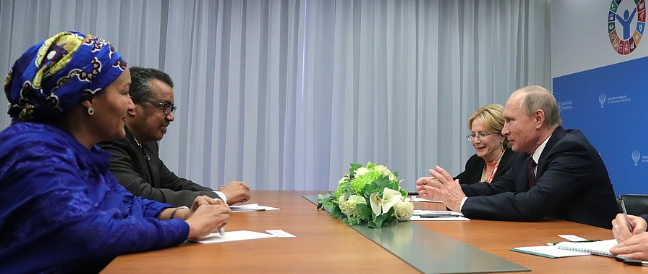
President Vladimir Putin and then-Health Minister Veronika Skvortsova met in Moscow on November 16, 2017, with UN First Deputy Secretary-General Amina Mohammed (1st left) and WHO Director-General Tedros Adhanom (2nd left). Tuberculosis control was the main topic for their discussion.
The May 4 draft was initiated by the EU, including its member states, plus Monaco, North Macedonia, San Marino, and Zambia; the UK did not sign. Read the full document here.
The draft backed the WHO and its staff, “acknowledg[ing] the leadership by the World Health Organisation and the fundamental role of the United Nations system in the comprehensive global response to the COVID-19 pandemic, and the efforts of countries in protecting their populations; [and] express[ing] its highest appreciation of the dedication, efforts, above and beyond the call of duty, of health professionals, other frontline and public workers, including WHO staff, in responding to COVID-19 pandemic.”
The May 4 draft also struck at the info-war operations Lavrov had identified on the part of the US, Australia and UK. The document called on international organisations and WHO governments to “address the proliferation of disinformation and misinformation, as well as malicious cyber-activities, that undermine the public health response, especially in the digital sphere, and support the provision of clear, objective and science-based data and information to the public.”
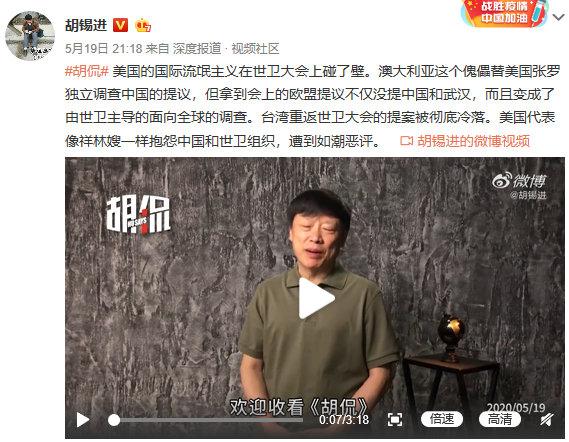
Chinese media reaction to the Australian campaign explicitly called the Australians “puppets” of the US. Hu Xijin, the editor of the state-run Global Times, commented: “Australia is always there, making trouble. It is a bit like chewing gum stuck on the sole of China’s shoes. Sometimes you have to find a stone to rub it off.”
Also in a direct counter to Trump Administration attempts to monopolize the commercial windfall of a Covid-19 vaccine, the EU draft called “for equitable access to and fair distribution to all countries including through using fully the provisions of international treaties, of personal protective equipment and the quality, safe, efficacious and affordable medical technologies, commodities and materials required in the response to the COVID-19 pandemic, in particular quality, safe, efficacious and affordable medicines and vaccines, and the urgent removal of obstacles thereto.”
Lavrov had attacked the US for “manifestations of ‘national egotism’ where the competition for being the first with a vaccine is not entirely scrupulous. There is information that the US is buying Sanofi, a French company, in the hope that it will be the first to develop the vaccine and that the US will get it. However, there are proposals from France and other European countries (which we share) that any positive result in this regard must be instantly made available internationally and the vaccine must be accessible to all.” Read the Russian story here.
For more details on the fight to prevent US and European pharmaceutical company profiteering from Covid-19 vaccines, read this.
The May 4 draft rejected Australian attempts to prejudge the origin of the virus. It directed the WHO Director-General to “work with the World Organisation for Animal Health (OIE), the Food and Agriculture Organization of the United Nations (FAO) and countries to identify the source of the virus and the route of introduction to the human population, including the possible role of intermediate hosts, collect evidence and provide guidance to reduce the risks of transmission of zoonotic diseases.”
Payne told the Australian media later that Australia was behind the wording of the provision for “an examination of the zoonotic origins of the coronavirus itself as well. So, for the lay person, that means that there is a series of steps that we put in place to look at some of the most important issues which we think have arisen out of COVID-19.” When Payne was asked to provide the Australian government text proving this, she could not.
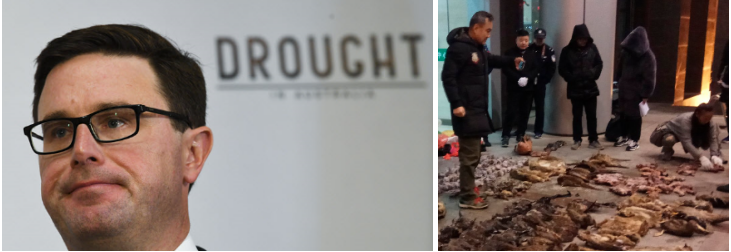
Left: Australian Agriculture Minister David Proudfoot, who has publicly identified the Wuhan wet market as the source of the Covid-19 pandemic. Right; Chinese officials inspect bat and rabbit carcasses at the Wuhan market. On the evidence that the appearance of Covid-19 in China was unconnected to the Wuhan market bats, read this. For fresh assessment of Covid-19 virus evidence of cases in November 2019 in Italy, France, and the US, read this.
The May 4 draft also demonstrated that the Australians and Americans had failed to persuade France, Germany and Italy to attack the WHO.
The language of the proposal for investigation explicitly placed this under the direction of the WHO Director-General who was asked to “initiate, as soon as possible and in consultation with Member States, a process of independent evaluation, including using existing mechanisms2, to review lessons learnt from the WHO-coordinated international health response to COVID-19, the effectiveness of the mechanisms at WHO’s disposal, the functioning of the IHR, WHO’s contribution to United Nations-wide efforts, and the actions of WHO and their timelines, and make recommendations to improve global pandemic preparedness; including through strengthening WHO’s Health Emergencies Programme”.
In a further attack on the Trump Administration for suspending US funding for the WHO, the EU called for “ensuring that the Secretariat itself is adequately resourced to support the Member States granting of regulatory approvals for COVID-19 countermeasures.”
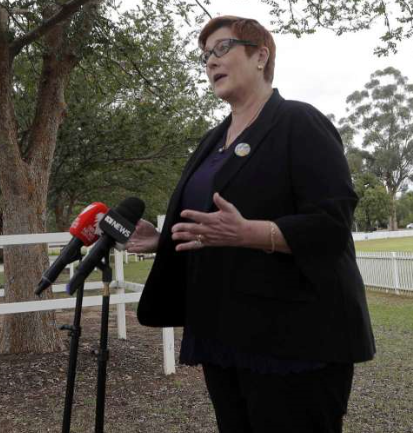
Payne (right) and other Canberra officials then told reporters they were responsible for a draft “Australian resolution [which] updates language originally proposed by the European Union and was initially backed by a range of countries, including the United Kingdom, Canada, New Zealand, Russia, India, Japan, Indonesia, and the entirety of the European Union’s membership. By Monday, 54 states that are part of the African Group joined as co-sponsors.”
Payne was lying to the press. No trace of her “Australian resolution update” can be found at the WHO Secretariat in Geneva, nor in the files of the Department of Foreign Affairs and Trade in Canberra.
Instead, the Indian delegation to the WHO released to the Indian media its revision of the EU draft, dated May 18. Read it in full here. There were now 36 co-sponsors, including Russia and the UK.
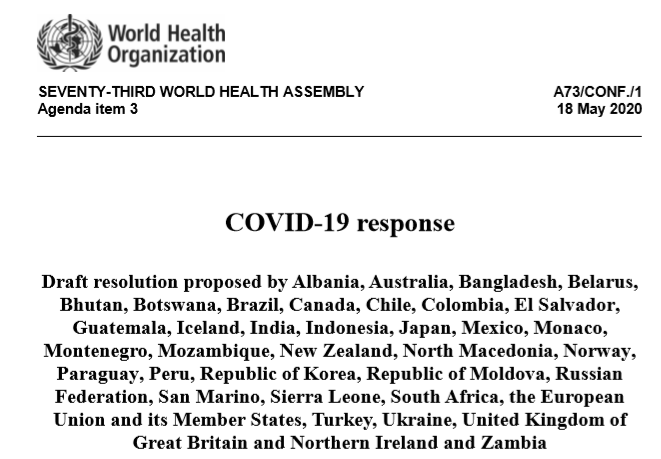
Source: https://apps.who.int
The revised language was even tougher on Trump’s threats, calling on WHO member states to “provide sustainable funding to WHO to ensure that it can fully respond to public health needs in the global response to COVID-19, leaving no one behind.” The revised draft was also more explicit on countering the Australian and American media campaign as “malicious cyber-activities that undermine the public health response”.
The new co-sponsors were as emphatic on stopping a US vaccine monopoly as the EU had been on May 4. They also directly attacked Trump’s personal endorsement of medications and disinfectants, calling on member states to “continue to work against substandard and falsified medicines and medical products.”
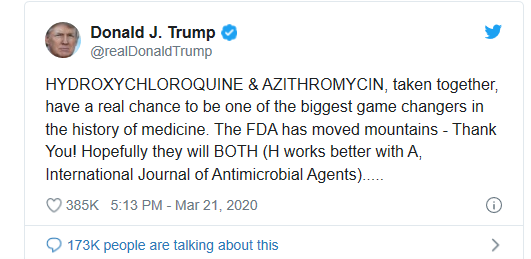
Source: https://www.washingtonpost.com
The terms of the WHO investigation remained those of the EU draft. The Australian-American campaign had failed.
Payne retreated by signing her government as a co-sponsor. She then called a press conference to claim credit for her retreat. “Has Australia abandoned its call for a fully independent review?” Payne was asked. “I think,” she answered, “in what is a comprehensive resolution, you will see that the review is specifically referred to as impartial, independent and comprehensive. They are three factors which we particularly have sought. The Prime Minister and I have also discussed a number of mechanisms within the WHO, including their independent oversight advisory body.” Under China’s criticism that to start the proposed investigation berfore the pandemic is under control is premature, Payne also backed down. “There are many countries around the world, including some of those who have been prepared to co-sponsor or just sign up to this resolution, who are still dealing with some of the most difficult aspects of the response. They are at the peak level of the crisis, and some are yet to experience that level. So we are very aware of that in terms of the timing as well.”
The defeat of the Australian-American campaign was visible in Geneva, hidden in Australia and the US. On Tuesday morning, May 19, the draft resolution had 55 sponsors, including China. The US refused to join the list. Read the final resolution in full.
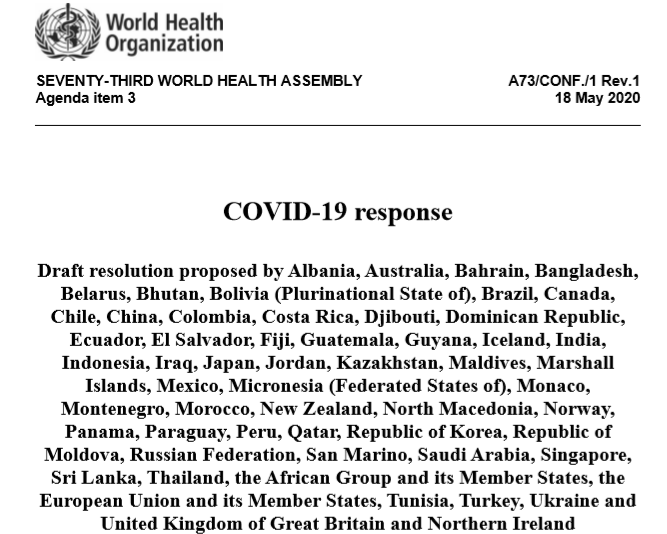
Source: https://apps.who.in
This was the text which was presented for a consensus vote in the Assembly on Tuesday afternoon; by then 137 countries had signed as co-sponsors. According to Harris of the WHO, when the director-general asked members to signal whether there was any opposition to the terms, “there were no hands up to oppose. The US did not oppose.”
“Australia was the first nation after the US to call for an independent probe, including into the initial handling of the outbreak in Hubei”, the state media organ Australian Broadcasting Corporation reported. Payne then went on state radio to deny the investigation into the origins of coronavirus which had passed the World Health Assembly was not what Australia originally proposed. She claimed the international community is now “at the beginning of this process.” She added: “I think what’s most important is the outcome for those who have lost loved ones and the international community … Australia is very pleased to see the decision made by the World Health Assembly overnight.”
Payne’s attempt at covering the failure of her campaign was “nothing but a joke”, the Chinese Embassy announced in Canberra.
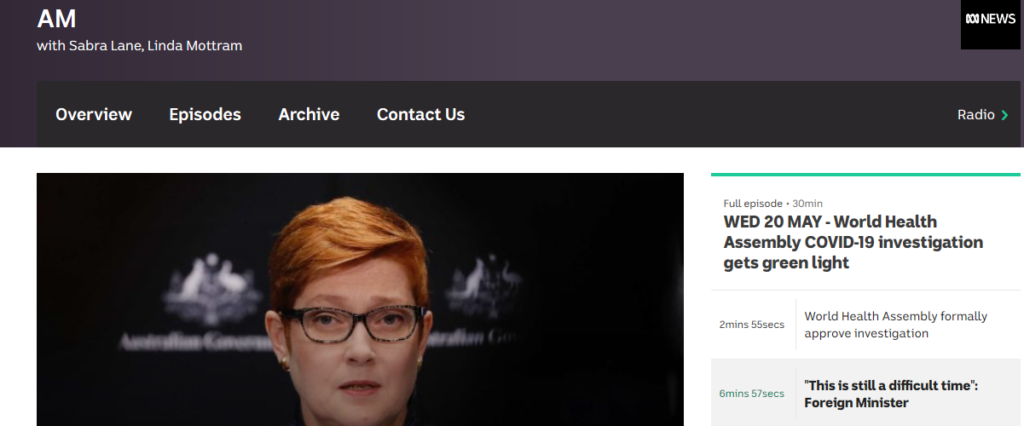
Listen to the radio broadcast here. Asked if Australian attacks on China had caused several billion dollars in trade “collateral damage to Australian farmers”, Payne said Australia was considering “next steps”. She can be heard retreating from each one of the Australian-American demands of last month. Asked if Australian exports of seafood, oats and fruit may be next if the Australians continue their campaign against China, Payne said: “we would be disappointed if there was any process of conflating these issues. We will deal with the trade issues on their merits…and Australia will always stand firm on protecting our national interests.”
A Melbourne newspaper followed Payne’s radio broadcast, reporting: “No longer a joke — why Australia’s COVID-19 inquiry campaign won the day…The last time Australia had played such a prominent international role was 2015, when Julie Bishop led calls to establish an MH17 inquiry after 298 people were shot out of the sky by a Russian-Ukrainian missile.” In the MH17 story, this archive shows the extent Australian officials have gone to fabricate the evidence now before a Dutch court.
The ownership of Australian newspapers is the most concentrated in the world, with two media groups, one of them Rupert Murdoch’s New York-based News Corporation, owning almost all of them. Counting newspapers, television and radio, only China and Egypt have a higher concentration through state ownership.
On Wednesday afternoon, Canberra time, the US Embassy issued this tweet:
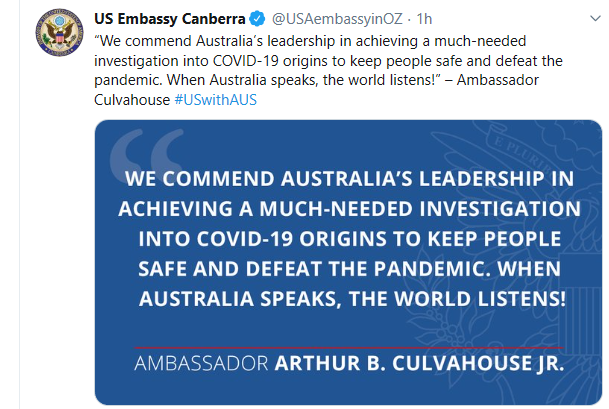











Leave a Reply